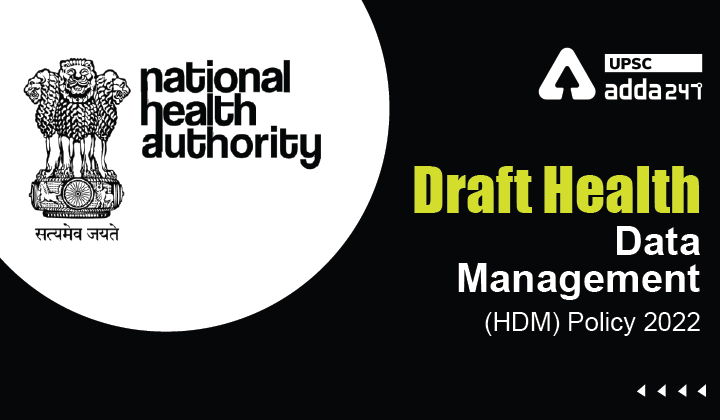Table of Contents
Draft Health Data Management (HDM) Policy- Relevance for UPSC Exam
- GS Paper 2: Governance, Administration and Challenges- Government policies and interventions for development in various sectors and issues arising out of their design and implementation.

Draft Health Data Management (HDM) Policy in News
- Recently, the National Health Authority (NHA) released a revised draft of the Health Data Management (HDM) policy for the Ayushman Bharat Digital Mission (ABDM).
Draft Health Data Management (HDM) Policy
- Background: The National Health Authority (NHA) had finalized and published the Health Data Management (HDM) Policy for the Ayushman Bharat Digital Mission (ABDM) in December 2020.
- Since then, NHA has received feedback from various stakeholders and had learned from the pilot and national rollout of ABDM.
- Based on these, few revisions in the HDM Policy are contemplated.
- About: Health Data Management Policy is the first step in realizing the ABDM’s guiding principle of “Security and Privacy by Design” for the protection of individuals’/data principal’s personal digital health data privacy.
- Significance: HDM Policy acts as a guidance document across the National Digital Health Ecosystem (NDHE).
- It also sets out the minimum standard for data privacy protection that should be followed across the board in order to ensure compliance with relevant and applicable laws, rules and regulations.
- NHM Policy will be dynamic in nature and may be revised from time to time as may be required. Necessary guidelines may also be issued for the implementation of the ABDM.
Key Objectives of the Health Data Management (HDM) Policy
The key objectives of HDM Policy are:
- To provide adequate guidance and to set out a framework for the secure processing of personal and sensitive personal data of individuals who are a part of the NDHE in compliance with all applicable laws;
- To safeguard digital personal data within the ambit of the NDHE, including the Personal Health Identifier, the electronic health records and electronic medical records, by implementing adequate technical and organizational measures across the NDHE;
- To create a system of digital health records which is easily accessible to individuals and health service providers and is purely voluntary in nature
- To increase awareness of the importance of data privacy and instill a privacy-oriented mindset among the members of NDHM and its ecosystem partners;
- To ensure portability in the provision of health services;
- To establish appropriate institutional mechanisms for auditing of the NDHE as needed and to encourage stakeholders and ecosystem partners to adopt the data protection principles set out in this Policy; and
- To leverage the information systems existing in the Indian health sector by encouraging conformity with the defined data privacy standards and integrating such existing systems with NDHE.




 TSPSC Group 1 Question Paper 2024, Downl...
TSPSC Group 1 Question Paper 2024, Downl...
 TSPSC Group 1 Answer key 2024 Out, Downl...
TSPSC Group 1 Answer key 2024 Out, Downl...
 UPSC Prelims 2024 Question Paper, Downlo...
UPSC Prelims 2024 Question Paper, Downlo...





